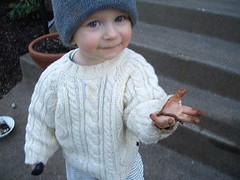Baby athletics
The Baby Book says babies generally can start flipping from belly to back at 3 months. So, just as I always knew, Eli's a genius.
scripsit |
 |
Thoughts on family, philosophy, and technology Profile |
And I really was shocked when he pictured Iraq like peaceful country where children play and people laugh happily, guess what Mr. Moore you are wrong coz I live in Iraq and children weren't playing they were working to live and people weren’t smiling they were either afraid of getting killed or arrested for no reason or just because they don’t like Saddam and they dared to say so.
Labels: family, philosophy
Eli is 18 days today, and he smiled 3 times, his mother tells me.
Why do babies smile? They seem to smile randomly at first -- when sleeping, or when they feel an interesting belly rumble. Are they able to smile only because they've seen some faces smile, and that has triggered this reflex, or would a baby spontanously smile without being shown how?
I guess in either case the whole complex activity of smiling is a "subroutine" that is built into us. One way or another it gets activated (and probably develops more), but it is there already, pre-wired, at least in a primordial form.
The interesting thing to me is that we smile pre-conceptually. Later in life we smile when we think about something we like. But a newborn is cognitively equivalent to a cat or dog, grasping perceptually and acting impulsively, without any thoughts for past or future ... and yet he smiles.
What really is the difference between the mind of a newborn and the mind of an animal? Babies have much more potential, of course, but do they have any more cognitive power actually? Does the human baby have a different type of cognition than that of an animal? Perhaps if babies didn't cognize differently from animals, they would never get beyond the purely perceptual-impulsive mode of animals.
The transition from pre-conceptual infant to conceptual child must be smooth and organic. Perception and impulsiveness must slowly gain traction for the conceptual-volitional mode of cognition.
Maybe it is better to say that perception and impulsiveness slowly form into a rational mind. Because the lower modes of cognition are in some sense the ingredients or basis of the higher modes. We conceive of and for perceptual reality (I think that that green thing is an 'apple', and then I know that that green thing is edible). And choice is the usage and regulation of the impulses by which we act (it is by choice that I enable the arm movement by which I take the apple to eat it).